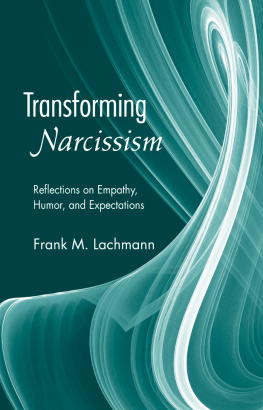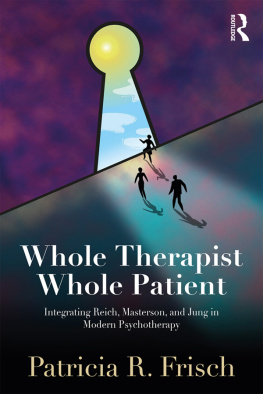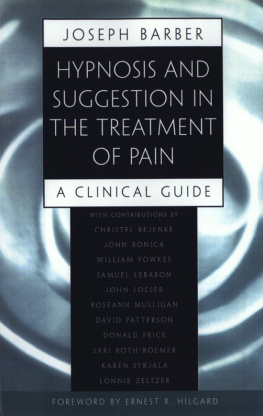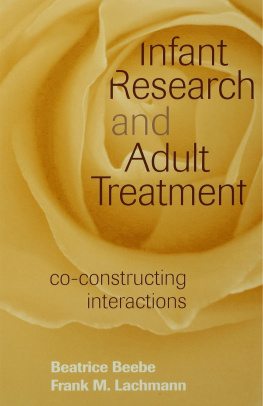Transforming Aggression
Psychotherapy with the
Difficult-to-Treat Patient
Frank M. Lachmann, Ph.D.

A JASON ARONSON BOOK
ROWMAN & LITTLEFIELD PUBLISHERS, INC.
Published in the United States of America
by Rowman & Littlefield Publishers, Inc.
A wholly owned subsidiary of The Rowman & Littlefield Publishing Group, Inc.
4501 Forbes Boulevard, Suite 200, Lanham, Maryland 20706
www.rowmanlittlefield.com
Estover Road
Plymouth PL6 7PY
United Kingdom
Copyright 2000 by Jason Aronson Inc.
First Rowman & Littlefield edition 2008
All rights reserved. No part of this publication may be reproduced, stored in a retrieval system, or transmitted in any form or by any means, electronic, mechanical, photocopying, recording, or otherwise, without the prior permission of the publisher.
British Library Cataloguing in Publication Information Available
Library of Congress Cataloging-in-Publication Data
Lachmann, Frank M.
Transforming aggression : psychotherapy with the difficult-to-treat patient. / Frank M. Lachmann.
p. cm.
Includes bibliographical references and index.
ISBN-13: 978-0-7657-0293-7
ISBN-10: 0-7657-0293-2
1. Aggressiveness. 2. Psychotherapy. I. Title.
[DNLM: 1. Psychotherapy. 2. Aggressionpsychology. WM 420 L138t 2001]
RC569.5.A34L33 2001
6.6.89'14dc21 00-038963
Printed in the United States of America
 The paper used in this publication meets the minimum requirements of American National Standard for Information SciencesPermanence of Paper for Printed Library Materials, ANSI/NISO Z39.48-1992.
The paper used in this publication meets the minimum requirements of American National Standard for Information SciencesPermanence of Paper for Printed Library Materials, ANSI/NISO Z39.48-1992.
To Annette, Suzanne, and Peter
Contents
Preface
Coming of age as a psychologist in the field of psychoanalysis just before its domination by the medical establishment declined presented an extraordinary challenge: how to get training in psychotherapy and psychoanalysis when many doors to analytic training were closed to nonmedical candidates. Among the reasons for this exclusion was the belief that psychoanalysis required a knowledge of medicine.
My graduate school education had emphasized psychological testing and research, but my fellow intern at Bellevue Hospital, Lloyd Silverman, whetted my interest in psychoanalytic theory. I was able to find psychotherapy training in the mid-1950s at a Veterans Administration outpatient clinic. Later, at the Postgraduate Center for Mental Health in New York, my training broadened to include psychoanalysis.
In those years, by training and temperament, I was an ego psychologist. Even then, as a psychologist, psychotherapist, and psychoanalyst, I was part of a distinct, still restricted minority. Likening this experience to having grown up as a Jew in Germany in the 1930s is a stretch, but being part of a discriminated-against minority was not unfamiliar to me. So, my reaction of frustration at being a psychologist when the practice of psychotherapy and psychoanalysis was open mainly to physicians is perhaps one, among my several motives, for writing a book on reactive aggression.
In the 1960s I became acquainted with the work of Heinz Kohut in a seminar on the development of psychoanalytic thought taught by Martin Bergmann, the consummate teacher, scholar, and practitioner of psychoanalysis. In the years I spent in one of his study groups I became acquainted with the vast and exciting literature of psychoanalysis.
I liked Kohuts challenge to the prevailing clinical and theoretical wisdom of psychoanalysis. In his early papers, I found a blueprint for a truly widening scope for psychoanalytic treatment. The attacks on Kohuts work by the psychoanalytic establishment that followed his writing for the next several years surprised and outraged me. Here, I believe, arose another motive for writing about aggression from the vantage point of Kohuts contributions.
In the 1980s, after Bob Stolorow and I had published Psychoanalysis of Developmental Arrests, I was invited to become a member of the Program and Publications Committee, the forerunner of the International Council for Psychoanalytic Self Psychology. Thereby my participation in the development of self psychology was assured, and, ironically, I became an even more active and committed member of an out-of-favor minority.
In the past two decades I have been struck by the combination of half-truths as well as by the valid questions that have characterized the criticism of self psychology in the psychoanalytic literature, case conferences, and especially in the meeting rooms and corridors at psychoanalytic conferences. The voices of relational psychoanalysis joined the chorus of classical Freudian analysts in looking askance at the theory of self psychology, and especially the clinical implications that grew out of the theory. Furthermore, relational analysts, whose ranks have swelled during the past decade, have been more radical than their classical analytic counterparts. They have advocated, if not actually throwing away the book, then deconstructing it, at least in the postmodern sense. Once again, I find myself swimming against the current. In my desire to maintain some continuity with the past, I am not prepared to join that chorus either.
Perhaps I am still clinging to a minority status. However, as I see it, I am primarily interested in the leading edge of theories rather than in examining them from a trailing-edge perspective. I have borrowed these edge terms from Heinz Kohuts view of interpretation. In making interpretations, Kohut advised, the leading edge addresses what the person is striving to achieve, and the trailing edge addresses the contents and conflicts that are avoided, repressed, or disavowed. Both edges are important in psychoanalytic treatment and in theory evaluation. But life among the trailing edges can be grim, whereas the leading edge carries hope and points to a direction for the future. In the course of this book I articulate the leading edge of self psychology in psychoanalytic treatment. To be able to do so provides me with another motive for writing this book. Contrary to the assumptions of its detractors, trailing-edge interpretations are not avoided in self psychology, but neither are they privileged.
A friend asked me if it had been difficult for me to switch to self psychology from my classical psychoanalytic beginnings. My friend remembered that I had taught the contributions of Arlow, Brenner, Greenson, and Jacobson, and the work of many other ego psychologists at the Postgraduate Center for Mental Health in New York. In responding, it struck me how easy that shift had been for me. In truth, I had been practicing as a self psychologist all along. I found in self psychology the framework that fit the way I had already been working in my practice.
The conservative in me has held on to aspects of the conflict model that I found useful as an ego psychologist. However, I think of conflict as a subjective experience that captures what a person is struggling to express, suppress, disavow, or attribute to others. I am not referring to conflict as the theoretical assumption that explains motivations and leads to compromise formations. The question of drives, what is innate, especially when it comes to aggression and destructiveness, is another matter and that will occupy the pages to follow.
Self psychology places its emphasis on individual uniqueness and on the uncanny resourcefulness and survival strivings of people. I like Kohuts focus on self-experience, thereby giving these strivings and resources a legitimate theoretical and clinical status. So I consider myself a self psychologist. Out of my history, my clinical experience, my theoretical biases and beliefs, and my desire to explain and extend self psychology, I strike back at its detractors.









 The paper used in this publication meets the minimum requirements of American National Standard for Information SciencesPermanence of Paper for Printed Library Materials, ANSI/NISO Z39.48-1992.
The paper used in this publication meets the minimum requirements of American National Standard for Information SciencesPermanence of Paper for Printed Library Materials, ANSI/NISO Z39.48-1992.